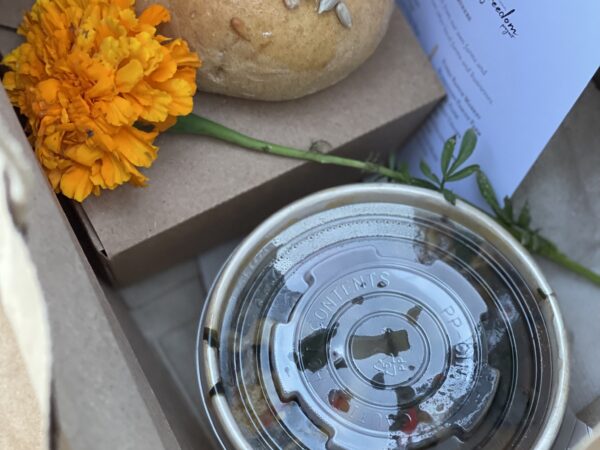by Caryn Roth
At Love to Table, we use food as the means to bring love, to sneak it into the rejected places, the crevices that may not often receive it. We offer our love to anyone who can use it, and we use food as the vehicle to bring it in. Whether a friend, a neighbor, or someone on the street — everyone eats, and anyone can connect over food.
One of our latest endeavors in Love To Table has been exploring how the experience would extend into a prison or jail. Can we bring our ethos of food as a love delivery system into cell walls, into kitchens where knives are chained to the counter, into institutions where food is known for being unappetizing and of poor quality?
We started dreaming about what a culinary kitchen at a prison or jail could look like, integrating the farm and kitchen, creating simple and nourishing meals, and training those in the institution with food service skills that they can use upon release. Our team has gotten to know the jail residents deeply through the Art of Soulmaking correspondence course, as well as working together in the jail’s garden and teaching Soulmaker and yoga classes. We wanted the program to offer a full experience of healing, from planting vegetables in the earth to harvesting to cooking to tasting the magic and nourishment of homegrown farm-to-table food.
As we build out our larger vision for our culinary program inside the Mendocino County Jail, we’re complementing that dream with on-the-ground delivery of our meals from our gardens. We can’t yet bring our food into the kitchens for jail residents, but a couple weeks ago we cooked our first farm-to-table meal for the staff and officers. We used vegetables from our farm and local partners for the meal and served a hearty soup, fresh bread rolls, and chocolate zucchini cake using the zucchini that we grew in the garden we started at the local Juvenile Hall. The staff inhaled the food. And one deputy was heard yelling, “Sarge! Come smell this BREAD!”
We brought the kids at Juvenile Hall the meal also and they were surprised and deeply touched. We generally donate the produce from their garden to the local senior center because they don’t have a commercial kitchen at Juvenile Hall, so they can only taste the fruits of their labor if we cook them something. Over the past few months we’ve made them salsa, green bean casserole, cookies, and zucchini bread using the garden produce. But this was the first full meal and there was a wonder and feeling of deep appreciation among the kids, seeing the flowers and bags that said “You are Loved” and tasting the freshly made bread and food. They asked if they’d get more meals like this and their eyes lit up when we said every month. For kids who often feel abandoned by the system and like everything they do doesn’t matter, there was a sense of pride in that they had grown the food for this meal — a feeling of mattering.
On all levels, big and small, we are using food to bring love and dignity to those in need in the prison and jail communities. Our weekly meal delivered that love to the staff at the jail, and the culinary program we’re developing inside our prison monastery will provide that to everyone eating the food in the jail, as well as to those who go through the program and leave with tangible skills. From a piece of fresh bread to a teaching program, food is a great connector and our way into people’s hearts.

 Get access to the monthly Rehumanization Magazine featuring contributors from the front lines of this effort—those living on Death Row, residents of the largest women’s prison in the world, renowned ecologists, the food insecure, and veteran correctional officers alike.
Get access to the monthly Rehumanization Magazine featuring contributors from the front lines of this effort—those living on Death Row, residents of the largest women’s prison in the world, renowned ecologists, the food insecure, and veteran correctional officers alike.